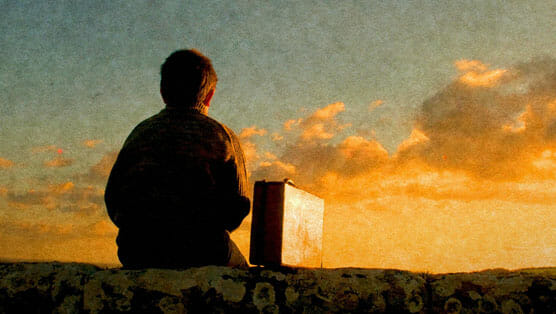Last Bus to Wisdom by Ivan Doig

Years ago when author Ivan Doig was asked about the pacing of English Creek, his first novel set in the sheep-ranching country of Montana, he replied:
“It never dawned on me that the actualities of life and how working people lived and went about their labors could be considered plodding; that you had to have green-eyed invaders from outer space before anything was happening… Along with its seasonal life, [the narrative needed] description of the country—sense of the country, sense of the past, as people tell stories and listen to stories… But, Christ, you could edit Faulkner and Conrad and Shakespeare and everybody else down to a third of their length and pretty much preserve what ostensibly happens. What you’d lose is the richness in life, and the richness in life is what I’m trying to get at.”
 Though hopelessly lacking in green-eyed space invaders, English Creek delivers a forest-fire climax that ought to leave any attentive reader winded, sweating and choking on the smoke. English Creek also introduces two Doig trademarks: breathtaking depictions of the western landscape and a finely tuned ear for regional dialogue matched only, among writers (roughly) of Doig’s generation, by Clyde Edgerton and Louise Erdrich. Doig effortlessly renders the multiple ways Montana ranchers and forest rangers inflect “son-of-a-bitch,” and leaves little doubt about the nuances of meaning that distinguish each one.
Though hopelessly lacking in green-eyed space invaders, English Creek delivers a forest-fire climax that ought to leave any attentive reader winded, sweating and choking on the smoke. English Creek also introduces two Doig trademarks: breathtaking depictions of the western landscape and a finely tuned ear for regional dialogue matched only, among writers (roughly) of Doig’s generation, by Clyde Edgerton and Louise Erdrich. Doig effortlessly renders the multiple ways Montana ranchers and forest rangers inflect “son-of-a-bitch,” and leaves little doubt about the nuances of meaning that distinguish each one.
What’s more, he doesn’t just know how these guys talk, but what they talk about. Tacked up in the English Creek national forest ranger station is a “carbon copy gag” detailing “Subjects under discussion during one summer (timed by stopwatch) by U.S. Forest Service crews, trail, fire, maintenance, and otherwise.” Entries include “Sexual stories, experiences, and theories, 37%”; “Personal adventures in which narrator is hero, 23%”; “Memorable drinking jags, 8%”; “Acrimonious remarks about bosses, foremen and cooks, 5%”; “Sarcastic evaluations of ex-President Hoover, 2%”; “Sears Roebuck catalogue versus Montgomery Ward catalogue, 2%”; concluding with “The job at hand, 1%.”
Over the course of a 36-year literary career, Doig, who died at age 75 last April, painted as detailed and complete a picture of the American West as any writer of the last century. Though he’s known best for the visual and pastoral quality of his writing, Doig remained, at heart, an old-fashioned storyteller. He populated his vision of the West not with gunslingers but with workaday ranch hands and dam builders and miners, frontier-town bartenders, itinerant schoolteachers, newspaper editors and Rocky Mountain Front kids from cobbled-together families like his own.
Doig wrote about Scottish immigrants homesteading and sheep-ranching in Montana in the 1880s; teaching in a one-room schoolhouse during a miners’ strike in 1919; catching on with the Fort Peck Dam Public Works Administration project in the 1930s; growing up in a Rocky Mountain Front barroom in the 1950s; and a grandfather traveling Montana with his journalist granddaughter to celebrate and editorialize the state’s centennial in 1979. Doig didn’t live through all those times, of course, and (as he described memorably in his 1978 memoir, This House of Sky) he chose to leave behind sheep ranching at a young age. But Doig grew up among people who built the West, and witnessed decades of growth and dramatic changes in the land and economy of the region. His death marked the passing of a vital connection to the people and the world and times he wrote about. Fortunately, he bequeathed to us all a bountiful body of work that’s not just Doig’s own legacy, but an evocative and definitive document of the world he came from.
Ivan Doig’s last book, the appropriately titled Last Bus to Wisdom, is an unpredictable and boisterous road novel about 11-year-old boy in the summer of 1951, cast adrift on the Greyhound “dog bus.” Last Bus to Wisdom offers a fresh take on several familiar Doig themes: nontraditional families, deep connection to the land, the West as a hardscrabble world of work and the profoundly (and often humorously) interwoven nature of everyday individual lives and political and social history.
-

-

-

-

-

-

-

-

-

-

-

-

-

-

-

-

-

-

-

-

-

-

-

-

-

-

-

-

-

-

-

-

-

-

-

-

-

-

-

-








































